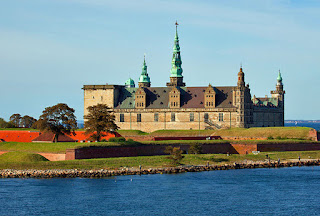The "Greatness" of Civilizations
A recent experience I had traveling got me thinking about the nature of greatness and civilization.
I was standing in line at passport control in the Los Angeles airport last year when I was overcome with a wave of nostalgia, triggered by the way the afternoon light came through the windows. Something about the sound and smells. I was home. I was born and grew up in L.A., not far from the airport. As a teenager I used to drive out to the airport and park and watch the planes come in.
The airport has changed a lot over the years. The architecture used to be late Tomorrowland with themes borrowed from Walt Disney’s idea of the future. Now it’s as drab as anywhere else, with extra security areas. I was in the line for the robots.
A burly black man in uniform directed me to my personal robot. I was to place my passport on the scanner and wait until it scanned my retina and took my photo. The robot read the information embedded on the microchip in my passport and decided that I could be admitted into the United States. It spat out a ticket.
I joined the next line. Now I remembered this place. I used to stand in this very spot years ago distributing books. I remembered the pillars and the chewing gum gray of the concrete floor. I would stop businessmen on the shuttle flight from San Diego, greeting them with “Good Morning Sir! Where you coming in from?” I would show them the Bhagavad-Gita and talk about the need for a spiritual life guided by the ancient wisdom traditions. In those days, first amendment rights of free speech were guaranteed in public places like airports. I had some interesting conversations with passengers, even meeting celebrities like Jack Lemmon, Neil Young, Wilt Chamberlain, and Rod Stewart.
More often then not the businessmen on the flight would ignore me and continue on with a blank stare. Not interested. But as I approached the officer who guarded my way home, I noticed the “Make America Great Again” coffee cup on his desk and remembered a particular conversation. In this exact spot back in the 70s I met an unusual man who stopped to talk with me for a few moments about the Bhagavad-Gita and the meaning of life. As the passengers in front of me edged forward nervously I reflected on our talk.
“Where you coming in from, sir?” I said with a smile, dressed in a three-piece suit and holding a Bhagavad-Gita.
“San Diego, sir. Is there some problem?”
“Well, sir, the problem is that while everyone is dying, no one believes that they’re going to die,” I said, handing him a copy of the Bhagavad-Gita As It Is, translated by A.C. Bhaktivedanta Swami Prabhupada.
“Yes, indeed,” the man said, looking at the book.
 |
| Book Distribution |
“It’s a promotion we’re doing here at the airport,” I said, reciting my spiel. “Everyone’s into it. This popular translation of an ancient classic is taking the country by storm.”
He was a thoughtful man, well-dressed, a bit short, glasses, olive complexion in his late 30s. Possibly European.
“I see. How much are you asking?”
“See, we’re all stuck in the cycle of repeated birth and death--we can’t get off the wheel of karma. This book explains how, through the process of bhakti-yoga or divine live, we can become liberated from the world of struggle and strife.”
“Is that so?” he said, paging through the illustrations.
“These are the ancient wisdom teachings from the greatest civilization,” I said, continuing with my pitch. He looked up and peered at me over his glasses.
“Any donation is acceptable. Most people are giving 10 dollars today.”
“The greatest civilization?” He said. “Well, I come from the greatest civilization, and I have never heard of this book. I tell you what, if you can guess where I’m from I’ll buy your book.”
“Well,” I said, “Some people would say that Queen Victoria had the greatest civilization the world has ever seen, since during her reign the sun never set on the British Empire. But you don’t seem British to me.”
“You’re right there sir,” the man said with a smile, exposing a gold tooth.
“And Los Angeles here was once part of Aztlan, the great Meso-American civilization the Mayans and Aztecs,” I said studying his eyes for a reaction, “But I don’t think you’re from around here.”
“Very good, sir. Go on.”
“Well, the Greeks dominated the ancient world with their black ships and with Alexander the Great conquered the world as far as the Hindu Kush. But you don’t seem Greek.”
“Not at all,” he laughed.
“On the other hand, the Egyptians raised pyramids out of the desert near Cairo.” His eyes brightened. I was onto him. “King Tutankhamen played with toy airplanes and fine golden ornaments over 3,000 years before us. I’d have to say you’re from Egypt.”
“Well done, sir. I’ll take your book.” He fished in his wallet for a ten-dollar bill. “I’m sure it will make for a very enlightening read.” He opened his briefcase and carefully put the Bhagavad-Gita inside. And with that he walked away from the concourse and my memory.
The line moved and jolted me out of my memory. That was long ago. No one was allowed to distribute books in this part of the airport anymore. I think the only place to buy books was in the airport book store. Back in the 1970s we weren’t the only ones to sell our literature in the airport. There were also the Black Muslims of Elijah Muhammed who sold a newspaper called “Muhammed Speaks.” There were a lot of first amendment groups expressing free speech back then. The high security everywhere reminded me that those days are gone now. One needs to be careful about what is said, these days. Times have changed.
 |
| Watch what you say. |
It was my turn. I had reached the uniformed man with the “Make America Great Again” coffee cup. He scanned my ticket and looked me in the eye. “What’s the purpose of your visit?” he asked.
I remembered that once when we crossed the border from Denmark into Sweden, my friend Bhakti Abhay Narayan Maharaja was asked the same question. We had driven from the Frankfurt airport to Helsingore, Denmark, home of Hamlet’s castle. We drove onto a huge ferry-boat that took us across the sea to Sweden.
When the guard asked him why he was entering Sweden, Narayan Maharaja became indignant. “This is my country,” he said. “How can you ask me that?!” But that was back in the 1980s. Now it is more prudent to mind one’s business and answer the questions.
“The purpose of my visit?” I said, glancing at the “Make America Great Again” coffee cup and the grim visage of the border guard who stood on the spot where I had once mused about the greatness of civilization. “I’m here to see my brother.”
“You have an address here in Los Angeles?”
“It’s here on the form,” I said, handing him the piece of paper.
He stamped me in.
“Welcome to the United States,” he said.
“Thanks.” I said, moving on to the baggage claim and customs check, where the proud inspectors of Immigrations and Customs would X-ray my ukulele for explosives.

As I exited passport control, I thought back on my conversation with my friend from Egypt. It had struck me then, and still does, that the essence of a great civilization sometimes vanishes, leaving behind only a trace.
The topless towers of Ilium or the glory that was Rome exist only in ancient poetry.
I have known language professors who became enamored of the Greek civilization; who traveled to Athens only to find disappointment. Nothing of the great civilization of Plato and Socrates of Homer, of Odysseus and Agamemnon lives in the ruins of the debased Greek spoken today in the markets of Athens and Sparta.
Tourists who visit the Great Pyramids of Giza and the Sphinx of Cheops are often shocked. Having paid thousands of dollars for a tour of great civilization, they find to their chagrin that these monuments to ancient culture are situated in a disaster zone. My Egyptian amigo was proud of the fact that the pyramids, one of the great wonders of the world, were built between 2560–2540 BC, and that the Great Pyramid of Giza was for more than 3,800 years, the Great Pyramid of Giza was the tallest man made structure in the world. Today, the Great Sphinx faces the stink and squalor of the filthy slums of Giza, called Nazlet al-Simman. From his position near the Great Pyramid, the Sphinx overlooks a Kentucky Fried Chicken restaurant as if posing questions about the price of a bucket of wings.
Agressive hawkers push cheap plastic trinkets on visitors, while tour guides sell tours on horse-back and camel and beggars demand baksheesh. Visitors looking for the grandeur of a lost civilization report a disgusting and disappointing experience. Tourists find ruins disconnected from the grandeur of ancient Egypt.
And if this disconnect is a characteristic of Greece and Egypt, what of India? Those who read the Bhagavad-Gita deeply know that the struggle that Arjuna faced was not, in the higher sense, a political struggle. The Battle of Kurukshetra was not fought merely as a conflict between the ancient kings of India. Arjuna’s battle is also representative of our own inner struggle. The message of the Bhagavad-Gita, as I tried to explain to my Egyptian friend long ago, is universal.
We are not merely adherents to an “Indian lifestyle.” Those who choose to dive deep into the message of the Gita are interested in its universal message. The Bhagavad-Gita takes up the issue of consciousness. It contemplates both subjective and objective experience, time and the world, the nature of action and inaction as seen in the subtle idea of karma. These ideas have a universal application. They have nothing to do with incense, saris, or the kind of tiara worn by the Maharaj of Maharastra.
India today is as degraded and corrupt as the slums of Cairo. Its once great language vitiated, its proud heritage damaged and demeaned. Just as Egypt is no longer the Egypt of the Pharoah and Greece is no longer the Greece of Homer, India is no longer the country of Vyāsa, of Krishna, and of Buddha.
Political movements to “Make India Great Again,” notwithstanding, India is no longer the India of the Bhagavad-Gita, just as Greece is no longer the Greece of the Iliad and the Odyssey and today’s Spain has little to do with the Spain celebrated by Cervantes in the Quixote.
But this does not mean that the message of the Bhagavad-Gita is less universal. Nationalist movements wherever they are celebrated have more to do with political ends than with spiritual ones. As Śrīdhar Mahārāja used to say, “Society Consciousnes and God Consciousness are always coming in clash.”
Nationalist movements to restore the greatness of particular countries are usually only methods used by cynical politicians to distract their citizens from more pressing problems of poverty and education. Indian politicians who wish to restore the glory of the past may be avoiding the problems of the present. They may wish to exploit the greatness of the Bhagavad-Gita to advance a political agenda.
But the Bhagavad-Gita resists such a facile interpretation, just as it has withstood the test of time. This is because its universal message touches on the true character of dharma and the nature of the human soul.
As the customs man returned my ukulele, now irradiated by the finest technology, I nodded thanks and went on my way, to see if America was truly becoming “Great” again.































